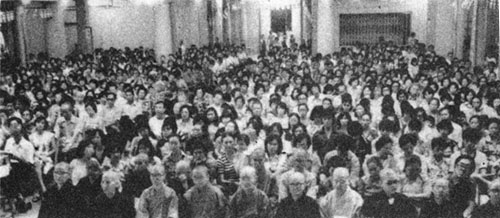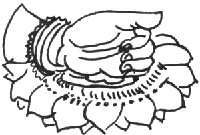Revolution
is the Sangha's Work

In July, ten members of the Sino-American Buddhist Association, tinder the leadership of the Venerable Master Hsuan Hua went on an Invitational lecture tour through Asia to propagate the Dharma. Throughout our travels in Malaysia, Singapore, Thailand, and Hong Kong for two months we were greeted everywhere with overwhelming enthusiasm. Thousands at-sand took refuge under the Triple Jewel. The Master, with both hands, dedicated the City of Ten Thousand Buddhas to Buddhists of the whole world, people of the whole world, and living beings of the whole world. Buddhism is in a state of dire decay in Asia. Without quick and substantive reform it will surely perish. The decision to dedicate the City of Ten Thousand Buddhas to the entire world is a direct move to prevent the impending destruction of Buddhism and to give it a chance to revive and develop worldwide.
Next year, on the nineteenth day of the ninth lunar month, in conjunction with the Dedication of the City of Ten Thousand Buddhas, there will be an International Convention of Buddhism convened at the City. Its aim will be to unite Buddhists of the world, Sanghins and lay-people, to seriously probe into the pitfalls of Buddhist practice; to launch a realistic program of reform; to draft a new constitution for Sanghins, and to elect a world leader of Buddhism.
The City of Ten Thousand Buddhas is dedicated to the world as the headquarters for Buddhism. It will serve as a place of spiritual refuge for all people, Buddhists and non-Buddhists alike.
In the following transcription of a talk given on October 2, 1978 at the City of Ten Thousand Buddhas, the Master reiterates his gift to the world and outlines the principles behind reform within the Sangha.
During this recent Asian tour and prior to it in America, I told people that the City of Ten Thousand Buddhas belongs to Buddhists of the whole world, to people of the whole world, and to all living beings of the whole world. Why? In cultivation, we shouldn't be selfish. The City of Ten Thousand Buddhas is prize land in America, and America is a super power in the world. The City of Ten Thousand Buddhas is a place where tens of thousands of Buddhas cultivate together. If we are cultivating together, there shouldn't be any selfishness or self-seeking. If I were to give the City only to Americans, that would be a serious mistake. If I were to hand it over to the Chinese, that would be an even graver error. Even if I let Americans and Chinese run it together, that would still not be a perfect solution. As I do not have the strength to take care of such a big place myself, I have decided to give it to all Buddhists, all peoples, and all living beings of the entire world. Not only Buddhists, but people of other religions as well can have a share.
This gesture means that none of us want to be selfish. Life is so short--just a few decades--why are we so attached to things and unable to put them down? Even if you were to live for several thousand years--so what? You're still running around upside-down, taking suffering for bliss and mistaking a thief for your son. Anyone who does not agree with my decision can bring up his or her opinions and we'll discuss them together. I will go along with the rule of the majority.
Along with this dedication of the City to the entire world, comes a suggestion for reform within the Sangha: that people who have left the home-life relinquish private ownership. Sangha members should be able to see through things and put them down. Once you indulge in private ownership, you have the means to do whatever you like, and you may end up doing a lot of things that are not in accord with Dharma. This is why I strongly urge left-home people not to keep any money or property under their private names, but to give it to the central assembly of the Sangha. Just this is practicing the Proper Dharma.
Ever since I was born, I have wanted to be unselfish, not just to work for myself. Up until ten years ago I didn't dare say that I didn't have a self, but in the past eight years I have wanted to be completely unselfish in my every act. From now on, you can watch me to see if in fact I'm working for myself or for others. And if I have the least bit of selfishness I hope you will tell me. As an observer, you will be able to see things more clearly than I. I vow that if I retain even a single hair's worth of selfishness, I am willing to suffer forever in the unintermittent hells. Why? Because I would be of no use to the world anyway.
Now some of you have studied the Dharma with me for ten years, some for nine, some for eight, and so forth. After so many years, I hope that you, too, will put aside your selfish thoughts. Do not grieve over your flesh and blood. Just try your best to cultivate and day by day your six types of close relatives and your friends will fare better and better, and will naturally be influenced to bring forth the resolve for Bodhi.
As for my disciples, whether they want to cultivate or not to cultivate, whether they want to leave home or return to lay-life and become Dharma-protectors--it's all fine with me. I don't worry about such matters. Why? If I did, that, too, would be a form of selfishness. When I say Everything's Okay, it just means not being selfish.
You should truly understand this: if we are still selfish, then how are we different from lay people? In Buddhism, there is always talk of the non-attachment to self, yet in your every move, you're still working for your own benefit. Whether you believe me or not, I do not care. I am going to start a revolution in Buddhism and I will spread this principle whether people want me to or not.
In Malaysia I called myself a horse that carries the Proper Dharma to all places. I also called myself a path, a road on which all Buddhists can travel from the ground of an ordinary person to the fruition of Buddhahood. I hope that all living beings will walk on me. I want to walk behind everyone, and not fight for name or gain. I will not worry about what happens to me after my death. After I die my body should be cremated. The bones and ashes should be ground into a powder with a little sugar or honey and fed to the ants. I want to create affinities with the ants. After they have made a meal of me, they should quickly resolve on Bodhi. I do not wish to leave any trace behind—no memorial halls, no stupas, not even a flesh body. Not a single mark. In this world all phenomena go through the stages of becoming, dwelling, decay, and emptiness. Why leave a mark? Someone asks: are you implying that the Sixth Patriarch was wrong in leaving a flesh body behind? No, by no means. The Sixth Patriarch was teaching and transforming the living beings of his time. I am teaching the people of this era. Each person has his or her own path; each one has his or her own aspirations.
This
time in Malaysia we met a lot of people, many of whom had dreamed of me
before I even arrived, strangely enough. Who do you think arranged that
type of publicity? And you still do not recognize what's going on! Then
let me tell you: in life after life these people were taught and
transformed by me. Therefore, upon seeing me again, in this lifetime, it
was like being reunited with their closest kin. Many of them were so happy
that all they could do was weep— especially the children. The twelve,
thirteen, and fourteen-year-olds all recognized me and didn't want me to
go. As we would leave the lecture halls, one would be tugging at my
sleeve, another pulling at my robe. Often I would have a child hanging
from each of the fingers on my hand—clinging with all their might.
They didn't want the car to drive away. Hundreds of them would
surround us. This is because since beginningless kalpas we have been
together. In the past maybe' I was their teacher, or they were my master;
maybe I was their son, or they were one of my next of kin. You can see
this burst of warmth was a response from past causes and conditions of
investigating the Dharma together. It was also a response from not being
selfish.
